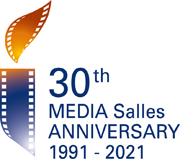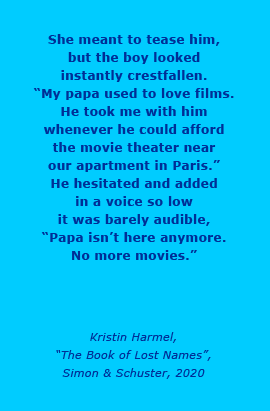|
When the trash of many becomes a treasure for everyone
by Elisabetta Brunella

 Not to resign ourselves to “trash” is one of the messages that emerges from the animated film “Trash - La leggenda della Piramide Magica”, which narrates the adventures of a series of waste products - a cardboard box, a soft-drink bottle, a battery container - all looking for a second life. But it is also one of the objectives clearly taking shape in the strategies of cinema exhibition businesses in their path towards sustainability. Not to resign ourselves to “trash” is one of the messages that emerges from the animated film “Trash - La leggenda della Piramide Magica”, which narrates the adventures of a series of waste products - a cardboard box, a soft-drink bottle, a battery container - all looking for a second life. But it is also one of the objectives clearly taking shape in the strategies of cinema exhibition businesses in their path towards sustainability.
Science and technology have a lot to say in this innovative approach. Suffice it to quote the exemplary case of Prof. Alireza Kharazipour, a keen film buff, who followed the intuition that came to him at the cinema, to re-use popcorn waste. Today the university where he teaches, the Georg-August in Göttingen, is in the avant-garde of experimentation in the application of this new material in various fields: from packaging (one of the sectors where most plastic is consumed) to furnishings, from the insulation of buildings to tableware. Single-use yes, but compostable.
Several cinemas are attempting to limit the use of plastic - often almost “invisible”, yet ever-present - for example in the form of the film covering the inside of paper containers.
There are two main directions in the most frequently adopted measures: to opt for biodegradable materials or those that can be recycled or to make sure that plastic recipients can be re-used several times.
The cinema Lux in Massagno, Canton Ticino, – newly renovated and with thermal insulation coating – has opted to re-use cups and flûtes, which have been personalised with the cinema’s own logo.
From the United States, in particular from the NCG chain with its 25 complexes in 9 states, comes the “free refill” formula, aiming to encourage the spectator to spend around 20 dollars on a giant bucket of popcorn at his first visit. Afterwards, for a whole year, the owner of the “magic bucket” can refill it as full as they like for just 4$ every time they revisit the cinema.
The “Recup / Rebowl” initiative also focuses on re-use. Widely used in Germany, it offers all businesses selling food and drinks in plastic containers a formula for encouraging the customer to return the classical coffee cup or salad bowl to one of almost 12,000 locations. As for the movie theatres, amongst the “early adopters”, the Cinecitta in Nürnberg stands out, the famous complex founded in 1995, which has continued not only to add to the number of its screens, but also to adopt increasingly advanced technology.
In terms of using alternatives to plastic, the Danish company Stay Well, launched during the Covid pandemic, supplies cinemas with recipients and other accessories - such as drinking straws for example - produced from bamboo fibre, a spontaneous plant from which products that have no need of chemical bleaching are derived.
In the United States, instead, the company Smart Planet Technologies proposes drinking cups without polythene film, which can therefore be introduced into the paper recycling process. Just to add to the confusion, they are also called reCups!
Unlike other stages in the ecological shift by movie theatres - such as replacing digital projectors fitted with xenon lamps with laser projectors or using energy from renewable sources - recycling and re-using materials used in the cinema, in particular those needed for the sale and provision of food, snacks and drinks, does not depend solely on the choices made by the exhibitor but also and most importantly on the cooperation of spectators and public institutions.
Otherwise, all that is recyclable may easily become not-recycled. And so it proves essential to focus on communication with the public, as has been done in the United States by the Cinemark circuit with its 4,000 screens. “It is not sufficient to provide containers, however colourful and with the clearest of graphics, to ensure that waste is differentiated on exiting the auditorium: in the haste and crowd it is improbable that the spectator will place a can or bottle in the right place,” remarked Art Justice, head of energy resource management for Cinemark, to Boxofficepro. “The customer must already know how waste is organised before leaving the auditorium. This is why we have chosen to project a short video before every screening.”
As to cooperation with public authorities, a virtuous example comes from Barcelona, where in 2018 cinemas in the city and the Municipality had already signed an initial agreement, later renewed, establishing a few objectives. Amongst them are the digitization of advertising, reduction in the use of plastic and polystyrene and staff training in waste management and energy saving. In return for these commitments, the cinemas involved obtain a 10% reduction on the taxes they pay for waste disposal.
In short, to sum up the ethics of the Italian film “Trash - La leggenda della Piramide Magica”, cinemas are gradually moving along a path that should transform “the trash of many into a treasure for everyone”.
This article was published in the June online issue of Cinema & Video Int'l, the MEDIA Salles media partner.
|






 not only in Italy but throughout the world, cinema exhibition is going through an epochal change after the shock caused by the pandemic.
not only in Italy but throughout the world, cinema exhibition is going through an epochal change after the shock caused by the pandemic.  Not to resign ourselves to “trash” is one of the messages that emerges from the animated film “Trash - La leggenda della Piramide Magica”, which narrates the adventures of a series of waste products - a cardboard box, a soft-drink bottle, a battery container - all looking for a second life. But it is also one of the objectives clearly taking shape in the strategies of cinema exhibition businesses in their path towards sustainability.
Not to resign ourselves to “trash” is one of the messages that emerges from the animated film “Trash - La leggenda della Piramide Magica”, which narrates the adventures of a series of waste products - a cardboard box, a soft-drink bottle, a battery container - all looking for a second life. But it is also one of the objectives clearly taking shape in the strategies of cinema exhibition businesses in their path towards sustainability.  Con l'obiettivo di lasciare la pandemia alle spalle, sono veduto qui in cerca di novità. Sono sempre stato curioso e capire che cosa c'è dietro l'angolo è importante per dare futuro alla sala. Questo è l'atteggiamento che, fin dall'inizio della transizione digitale, mi aveva spinto a partecipare ai corsi di formazione di MEDIA Salles nei vari paesi europei. E poi vorrei proporre qualcosa di nuovo ai miei spettatori.
Con l'obiettivo di lasciare la pandemia alle spalle, sono veduto qui in cerca di novità. Sono sempre stato curioso e capire che cosa c'è dietro l'angolo è importante per dare futuro alla sala. Questo è l'atteggiamento che, fin dall'inizio della transizione digitale, mi aveva spinto a partecipare ai corsi di formazione di MEDIA Salles nei vari paesi europei. E poi vorrei proporre qualcosa di nuovo ai miei spettatori. Issue no.
Issue no. 